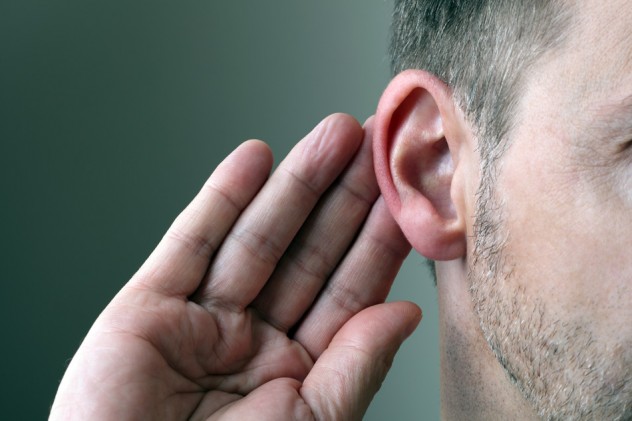 Weird Stuff
Weird Stuff  Weird Stuff
Weird Stuff  Health
Health Ten Confounding New Inventions from the World of Biomedicine
 Creepy
Creepy 10 Death Superstitions That Will Give You the Creeps
 Movies and TV
Movies and TV 10 Movies That Get Elite Jobs Right, According to Experts
 Weird Stuff
Weird Stuff 10 Times Real Laws Were Based on Bizarre Hypotheticals
 Animals
Animals 10 Inspiring Tales of Horses Being Human
 Mysteries
Mysteries Top 10 Haunting Facts About the Ghost Ship MV Alta
 History
History 10 Surprising Stories About the Texas Rangers
 Humans
Humans 10 Philosophers Who Were Driven Mad by Their Own Theories
 Miscellaneous
Miscellaneous 10 Video-Game-Worthy Weapons and Armors from History
 Weird Stuff
Weird Stuff 10 Warning Labels That Exist Because Someone Actually Tried It
 Health
Health Ten Confounding New Inventions from the World of Biomedicine
 Creepy
Creepy 10 Death Superstitions That Will Give You the Creeps
Who's Behind Listverse?

Jamie Frater
Head Editor
Jamie founded Listverse due to an insatiable desire to share fascinating, obscure, and bizarre facts. He has been a guest speaker on numerous national radio and television stations and is a five time published author.
More About Us Movies and TV
Movies and TV 10 Movies That Get Elite Jobs Right, According to Experts
 Weird Stuff
Weird Stuff 10 Times Real Laws Were Based on Bizarre Hypotheticals
 Animals
Animals 10 Inspiring Tales of Horses Being Human
 Mysteries
Mysteries Top 10 Haunting Facts About the Ghost Ship MV Alta
 History
History 10 Surprising Stories About the Texas Rangers
 Humans
Humans 10 Philosophers Who Were Driven Mad by Their Own Theories
 Miscellaneous
Miscellaneous 10 Video-Game-Worthy Weapons and Armors from History
10 Weird Tricks To Make Your Life Easier
We all know that things like exercise and a proper diet are important for a healthy lifestyle, but in a world where everyone’s looking for the easy route, those don’t always cut it. Instead, we need to see improvement immediately. So buckle up. Here are 10 weird tricks and facts that can help you get ahead—even if you need to pretend that life is an elaborate video game first.
SEE ALSO: 10 Easy Tricks To Greatly Enhance Your Memory
10 Think Of Life As A Video Game

The prevailing opinion of video games is that they’re a waste of time. But according to a study from Michigan State University, video games can be effective tools that allow us to maintain and enhance our relationships.
Another study showed that video games proved more effective than medication for treating depression and anxiety. And using that concept, one game designer (while recovering from a concussion) came up with the idea that these benefits were a result of the mindset a video game creates.
She created a game called SuperBetter, in which real life obstacles were viewed from the perspective of a video game. She turned each stage in her physical therapy into quests. Positive changes became power-ups, and setbacks were the “bad guys” to be defeated. And according to Forbes, the game actually works.
9 Posture

Our social hierarchy dictates that every group of two or more people contains at least one dominant and one submissive member. It’s not always easy to see, but people tend to pick up on the body language of others and react accordingly. If you act shy, they’ll assume a more dominant position, and vice versa. And it’s not just others who react to you—your mind reacts to your own body language.
In an experiment at Harvard, those in a dominant stance had measurably higher testosterone and lower cortisone (higher cortisone equals higher stress), and the results were reversed for people in a submissive stance. With just a slight adjustment to their posture, the submissive people reported feeling more confident and better able to deal with stress.
8 Stop Eating

Food actually plays an important role in our sleep rhythms. The body is normally controlled by circadian rhythm, a biological clock that generally syncs up with the cycle of night and day. But according to research performed by Clifford Saper, we have another internal clock—a food clock—that can step in and take primary control. When animals have a restricted food supply, their bodies will adjust to a new rhythm that allows them to forage more often. Saper found that this process can be utilized by humans as well.
If you want to adjust to a new sleep schedule, all you have to do is stop eating 16 hours before the time you want to wake up. If you’re starting third shift at a new job and need to be awake at 9:00 PM, stop eating at 5:00 AM that morning. The body can adjust to this new rhythm in as little as one day.
7 Don’t Try To Succeed

Most people are of a particular mindset: if you work harder you’ll be successful, and if you’re successful you’ll be happy. According to psychologist Shawn Achor, the reality is actually the opposite. Every time you achieve a goal, your brain raises the threshold of success. Success now becomes a matter of getting a better job or getting a better grade on the next test. The measure of what it means to be successful always increases.
What Achor found is that happiness is caused by noticing positive environmental factors instead of negative ones. He concluded that a brain with a positive mindset is 31 percent more effective than a neutral, stressed, or negative mindset. Doctors are 19 percent more accurate with their diagnoses when approaching problems with a positive mentality. It sounds kind of cheesy, but the findings were backed by another study that showed gratitude led to an overall feeling of well-being. So just think positive, and you’ll be happier.
6 Use Your Other Hand

Most of us have one dominant hand and one that isn’t much use when it comes to everyday tasks. In an awkward segue, quite a few people have trouble controlling their anger. Many of you are probably getting angry just reading this. But there’s an unusual way to curb that aggression; according to studies performed by Dr. Thomas Denson, all you have to do is use your less dominant hand.
Denson discovered that when people made an effort to use their non-dominant hand for everyday tasks, their anger levels dropped noticeably over the course of several weeks. Participants were placed on a brain scanner while Denson insulted them repeatedly. Afterward, they were tasked with using their non-dominant hand for two weeks. At the end of that period, they were scanned again, and Denson found their aggression centers less active. At the same time, parts of the brain associated with self-control became more active. This is because exerting self-control in one area (such as which hand you use) can help with your self-control in other areas as well.
5 Limit Your Choices

In a study by Sheena Iyengar, shoppers at a grocery store were presented with a table of free samples—six types of jam. On a another day, the same table had 24 total flavors. While the larger display drew a bigger crowd, only three percent of those people actually bought one of the jams. At the six-jam table, 30 percent of those who tasted a sample bought a jar.
When we’re given a choice, we often assume that we’ll be more likely to find something we like with a wider selection. But when presented with too many options, people are more likely to not make a decision at all.
4 Music

As much as we listen to music, we don’t have a clue why everybody likes it so much. When researchers at the Institute of Medical Science in Japan set out to find the answer, they discovered that music has more than an emotional influence on us—it has a physiological effect as well. Music has the tendency to improve our dopaminergic neurotransmission, which is a fancy way to say it releases the chemical dopamine in our brains.
Typically, dopamine is associated with our pleasure and reward centers, and it’s also closely linked with drug addiction. In a sense, listening to music is enjoyable because it gives us a buzz. But it also has another effect: The study found that our brains produce more of a certain type of calcium while listening to music, and that calcium is vital for lowering blood pressure. After only 30 minutes of exposure to Mozart, rats had their blood pressure drop a full 20 mmHg (millimeters of mercury), which is the difference between high and normal blood pressure.
3 Use Your Right Ear

If you’re having trouble hearing someone, what do you do? Most people crane their neck toward the speaker. As it turns out, that’s the perfect thing to do—but probably not for the reason you think. Most people are aware that the brain is split into two hemispheres. Each hemisphere is dominant in different areas, such as perceiving sound, and the left hemisphere is typically responsible for spoken language.
As it turns out, our right and left ears are are also dominant when it comes to different functions. The right ear is better at receiving speech than the left ear—which makes sense. Signals from the right side of the body end up in the left side of the brain. So next time you can’t hear someone, make sure you give them your right ear.
2 Bright Colors

Duncan Smith led a team of researchers at the University of Essex to determine how color affects mood and found that bright colors had a huge impact on reaction times and memory. Participants in the study were shown either “sunny” colors or bland, gray images, and then asked to perform a series of cognitive tests. The group that was shown sunflower pictures scored an average of 25 percent higher on the mental acuity tests than those shown gray colors. Even stranger, they also had a nine percent increase in physical strength. The researchers concluded that bright colors increase alertness, and red seemed to give the participants more confidence.
But the color red plays weird tricks on the human mind in any situation. Diana Widermann found that red can not only make you a better athlete, but also make others think you’re performing better. She took a video of a martial arts fight and digitally switched the colors of the fighters’ uniforms. She then showed both versions of the video to different groups of judges. Both groups rated the fighter in red as the winner. So if you want to succeed, wearing red isn’t a bad place to start.
1 Elaborative Encoding

The USA Memory Championship is an annual competition in which people compete to memorize the most information in the shortest amount of time. In one of the events, contestants are given five minutes to memorize 500 numbers in a specific order. The record holder correctly recited 303 digits.
How does a person store all that information? If you ask them, they’ll tell you their memory isn’t anything extraordinary. Anybody can learn to perform these feats using a technique called elaborative encoding. The idea is that the human brain is better at memorizing images than anything else. And by extension, if you can associate something abstract (like a number) with an image, your brain will more easily recall it. If we were to throw a random number at you (such as a phone number: 475-6732), sure, you could memorize it, but could you write it from memory a week from now?
Now try this: Close your eyes and imagine your living room. Everything looks normal, but there are four purple tigers in the chair beside you. To your left, you see a baker carrying seven loaves of bread. Above him are five fish, swimming through the air. You can go on and on, associating every number with a distinct image. This creates a “memory journey” from one image to the next, and the more bizarre the imagery, the easier it is to recall the information.
We aren’t really sure how you closed your eyes to imagine that and kept reading though—you’ll need to teach us that trick.








